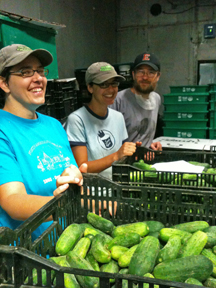Real Pickles: Financing Case Study
Community Investment in the Local Food System
How a small local food business in western Massachusetts preserved its social mission through transitioning to a worker-owned cooperative and using an innovative financing strategy.
Authored by: Jonathan Ward, Special Projects Intern, Community Involved in Sustaining Agriculture (CISA)
With significant contributions from:
Margaret Christie, Community Involved in Sustaining Agriculture (CISA)
Addie Rose Holland & Dan Rosenberg, Real Pickles
Jeff Rosen, Solidago Foundation
Sam Stegeman, Pioneer Valley Grows (PVGrows)

Worker-owners with fresh cucumbers at Real Pickles in Greenfield. Photo: Real Pickles
Abstract
“We’re re-writing the standard storyline for a successful organic food business,” says Dan Rosenberg, founder of the twelve-year-old Greenfield, Massachusetts company Real Pickles, which makes naturally fermented and raw pickles from regionally-grown vegetables in a 100% solar-powered facility. Instead of selling their growing company to a large industrial food corporation, as happens so often with successful natural products businesses (think: Odwalla, Naked Juice, Tom’s of Maine, Stonyfield, and so on), Rosenberg and his wife Addie Rose Holland (who had joined him in running the business in 2004) went the other direction, deciding to keep Real Pickles small, locally owned, and mission-driven. In late 2012, Rosenberg and Holland formed a worker-owned cooperative with other staff members, and funded the co-op’s purchase of the business through a highly successful community investment campaign that raised a half-million dollars.
Transitioning to worker-ownership gave the company a way to protect its social mission. Since its founding, Real Pickles has been committed to promoting human and ecological health by providing people with delicious, nourishing food and by working toward a regional, organic food system. In order to help ensure that this mission would continue, the worker-owners inscribed these principles in the co-op’s organizing documents, and made them very difficult to change. Still, even after organizing the cooperative structure, the worker-owners needed to raise a half-million dollars to buy the business from Rosenberg and Holland. They considered a number of options for financing, from subordinated debt to equity. In making these decisions, the worker-owners drew from the experience that one of them had had working with Equal Exchange, a successful cooperative that has a long history of raising capital by selling non-voting preferred stock. Later, they sought the expertise of the PVGrows collaborative network in western Massachusetts. A financing expert in PVGrows also connected Real Pickles to Cutting Edge Capital, a pioneering law firm in the Bay Area that helped them navigate many legal hurdles. In the end, the worker-owners decided that the best way for them to raise $500,000 was to sell non-voting preferred stock through a direct public offering. Real Pickles officially launched a community investment campaign in March 2013. Astonishingly, in just two months, the campaign was over. Seventy-seven investors – a mix of individuals, customers and suppliers, even a number of other co-ops – together invested $500,000, which allowed Real Pickles to fully transition to worker-ownership.
With interest growing in scaling up local food systems, the story of Real Pickles’ co-op transition and community investment campaign offers important lessons. Communities need businesses that can model ways to stay small, vibrant, and locally owned. This story is both inspirational and rich in technical detail so that others can speak about it, replicate it, and, ultimately, build upon it to fit their own visions of resilient local economies.

